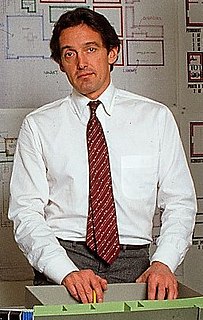A Quote by Kurt Vonnegut
I think about my education sometimes. I went to the University of Chicago for awhile after the Second World War. I was a student in the Department of Anthropology. At that time they were teaching that there was absolutely no difference between anybody. They may be teaching that still. Another thing they taught was that no one was ridiculous or bad or disgusting. Shortly before my father died, he said to me, ‘You know – you never wrote a story with a villain in it.’ I told him that was one of the things I learned in college after the war.
Quote Topics
About
Absolutely
After
Another
Anthropology
Anybody
Awhile
Bad
Before
Between
Chicago
College
Department
Died
Difference
Disgusting
Education
Father
Father Died
Him
Know
Learned
May
Me
My Father Died
Never
No Difference
One Of The Things
Ridiculous
Said
Second
Second World War
Sometimes
Still
Story
Student
Taught
Teaching
Thing
Things
Think
Time
University
Villain
War
Were
World
World War
Wrote
Related Quotes
My father died right after the movie Rain Man was released. He got to see it, then literally the day before he died, he asked Mama to take him to see it one more time - because he knew he was declining. Tom's assistant at the time told him my father died, and he wrote me a very personal note. I haven't seen him since, but you can't say anything bad about Tom Cruise to me, because anybody who takes the time to do that is very special.
Traditional education focuses on teaching, not learning. It incorrectly assumes that for every ounce of teaching there is an ounce of learning by those who are taught. However, most of what we learn before, during, and after attending schools is learned without its being taught to us. A child learns such fundamental things as how to walk, talk, eat, dress, and so on without being taught these things. Adults learn most of what they use at work or at leisure while at work or leisure. Most of what is taught in classroom settings is forgotten, and much or what is remembered is irrelevant.
I did not know much history when I became a bombardier in the U.S. Air Force in World War II. Only after the War did I see that we, like the Nazis, had committed atrocities... Hiroshima, Nagasaki, Dresden, my own bombing missions. And when I studied history after the War, I learned from reading on my own, not from my university classes, about the history of U.S. expansion and imperialism.
I want the marginality to come into the center. This is the thing I was conscious of growing up, when I later lived in England. I saw all these war movies that came out shortly after the war, and they were all about the war being fought by Englishmen or Americans, there were no other "allies" in it - from India or Australia, etc.
I was a Teletype operator in the army, so that's where I learned to type. One day, I went downstairs to see if I could still type - I hadn't done it for four or five years after the war. So I typed out a page and I showed it to my wife and she said, "Where did you get this?" I said I wrote it. "You wrote this?" It was something very funny. I went and wrote another page, another couple of pages, and by the time I was finished I had 13 little short stories, humorous short stories.
After my mother died, I learned that she'd had a scholarship to the University of Nebraska, but - in kind of a tradition that females don't do things like that - her father prevented her from going. She always said that she wasn't allowed to go to college, but until she died, I never knew that she'd had this scholarship.
One of the biggest problems I found with Irish politics and the economic thing was after the war, after World War II, most of the European countries started to develop economically and socially, but whatever way the Catholic church they took a grip and they almost governed the country. I mean, we were almost like a dictatorship. There is good and bad, but we experienced an awful lot of bad, especially from the institutions that taught children the Christian brothers, etc.
It was Harry Patch, who was the last living World War I veteran; and by veteran I mean someone who actually fought in the war, he didn't just happen to be in the army at that time, in the Great War. And when the Iraq War started, he was interviewed, and they said, well what do you think of this? And he said, in a very sad voice, "Well, that's why my mates died. We thought we were going to end all that sort of thing."
Why did the people think [Vietnam war] was fundamentally wrong and immoral? The guys who ran the polls, John E. Rielly, a professor at the University of Chicago, a liberal professor, he said what that means is that people thought too many Americans had being killed. Another possibility is they didn't like the fact that we were carrying out the worst crime since the Second World War. But that's so inconceivable that wasn't even offered as a possible reason.
It has been said that the essence of teaching is causing another to know. It may similarly be said that the essence of training is causing another to do. Teaching gives knowledge. Training gives skill. Teaching fills the mind. Training shapes the habits. Teaching brings to the child that which he did not have before. Training enables a child to make use of that which is already his possession.




































